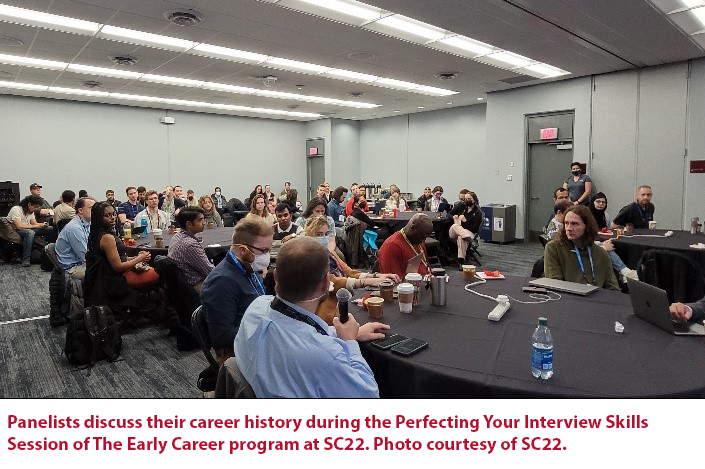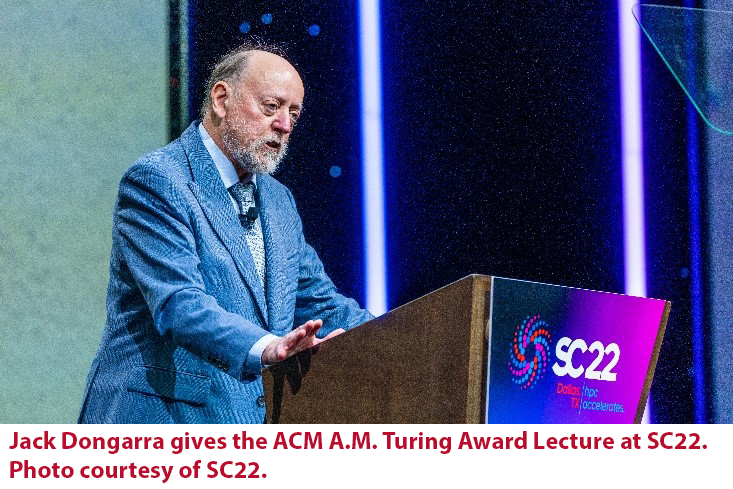CARC team travels to Dallas for supercomputing conference
By Elliott Robinson
 In November 2022, the UNM Center for Advanced Research Computing (CARC) sent a team to SC22, formally known as the International Conference for High Performance Computing, Networking, Storage, and Analysis. At this year’s conference, CARC partnered with the SC22 Event Planning Committee to help organize and run a program designed to aid people in the early stages of their career in the field of high-performance computing. CARC IT Manager Hussein Al-Azzawi and UNM Computer Science Student Harshita Sahni have planned for this event all year. Run by experts in the field of high-performance computing, including CARC’s Applications Scientist Matthew Fricke and CARC’s Director Patrick Bridges, the event consisted of a series of workshop-style sessions and pre-conference webinars. Topics for the sessions included securing funding, finding mentorship programs, ways to self-promote, polishing communication skills, resiliency training, interview skills, and time management. Fricke and Bridges participated in the interview skills workshop, which was broken up into two sections. During the first part of the session, a panel of experts, including Fricke, discussed their career histories and progress to provide advice to those at the workshop. In the second part of the session, experts in the field of high-performance computing, including Fricke and Bridges, held mock interviews and resume critiques. The workshop was a great success and would not have been possible without Al-Azzawi and Sahni’s extensive planning.
In November 2022, the UNM Center for Advanced Research Computing (CARC) sent a team to SC22, formally known as the International Conference for High Performance Computing, Networking, Storage, and Analysis. At this year’s conference, CARC partnered with the SC22 Event Planning Committee to help organize and run a program designed to aid people in the early stages of their career in the field of high-performance computing. CARC IT Manager Hussein Al-Azzawi and UNM Computer Science Student Harshita Sahni have planned for this event all year. Run by experts in the field of high-performance computing, including CARC’s Applications Scientist Matthew Fricke and CARC’s Director Patrick Bridges, the event consisted of a series of workshop-style sessions and pre-conference webinars. Topics for the sessions included securing funding, finding mentorship programs, ways to self-promote, polishing communication skills, resiliency training, interview skills, and time management. Fricke and Bridges participated in the interview skills workshop, which was broken up into two sections. During the first part of the session, a panel of experts, including Fricke, discussed their career histories and progress to provide advice to those at the workshop. In the second part of the session, experts in the field of high-performance computing, including Fricke and Bridges, held mock interviews and resume critiques. The workshop was a great success and would not have been possible without Al-Azzawi and Sahni’s extensive planning.
 UNM alumnus Jack Dongarra, winner of the 2021 ACM A.M. Turing Award, gave the ACM A.M. Turing Award Lecture at SC22. Dongarra explained his work and its impact on the field of high-performance computing. The focus of his lecture and work are his open-source software libraries that employ linear algebra. These libraries employ linear algebra to allow high-performance computing software to be stored online, transported between hardware without changing the software, and optimized by multiple researchers at once. Dongarra’s work has greatly streamlined the field of high-performance computing by allowing software to more efficiently make use of the capabilities of the hardware it is running on.
UNM alumnus Jack Dongarra, winner of the 2021 ACM A.M. Turing Award, gave the ACM A.M. Turing Award Lecture at SC22. Dongarra explained his work and its impact on the field of high-performance computing. The focus of his lecture and work are his open-source software libraries that employ linear algebra. These libraries employ linear algebra to allow high-performance computing software to be stored online, transported between hardware without changing the software, and optimized by multiple researchers at once. Dongarra’s work has greatly streamlined the field of high-performance computing by allowing software to more efficiently make use of the capabilities of the hardware it is running on.
CARC ran a small exhibition booth on the trade floor, which served as both a showcase for CARC’s most recent projects and as a homebase for the people from UNM that attended the event. The exhibition booth displayed digital posters highlighting the most relevant research projects conducted with CARC’s resources. Featured projects include Dr. Jeremy Hogeveen’s study on how our brains make choices, the groundbreaking immunology discovery made by a research team led by Dr. Irene Salinas, Ph. D. candidate Khaled Talaat’s study on the use of molten lead as a coolant for nuclear reactors, and many other projects.
SC22 provided many invaluable opportunities for those within the field of high-performance computing. Each year the conference provides a place for researchers and technicians to speak directly with the companies that make the hardware and software they use, for colleagues to coordinate projects, and for anyone in the field to share and learn about high-performance computing projects. The conference also provides a place for educators to mentor students interested in high-performance computing, researchers to exchange information, and laboratories and universities to recruit new students and staff. The information CARC staff gain from attending the conference every year would alone be worth attending the conference, as it allows staff to continually improve the center’s cutting-edge computing resources.
